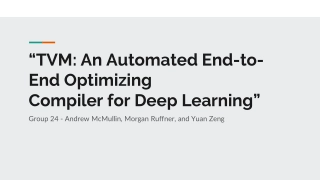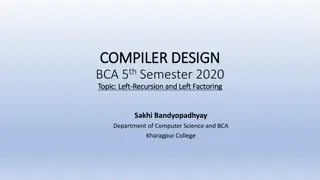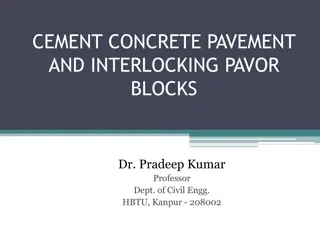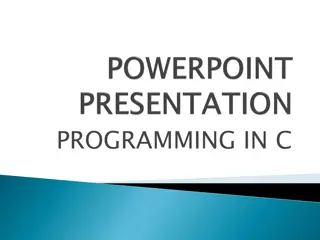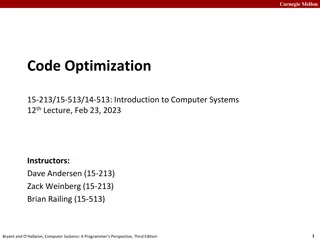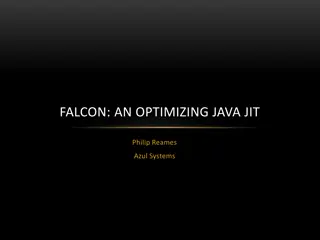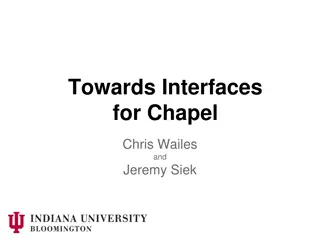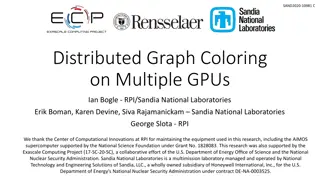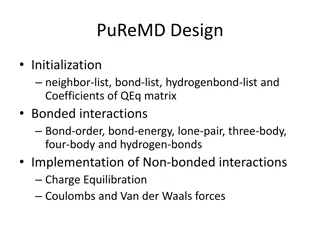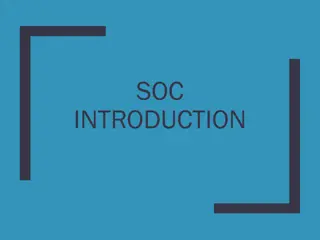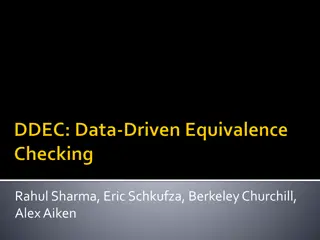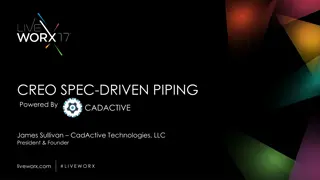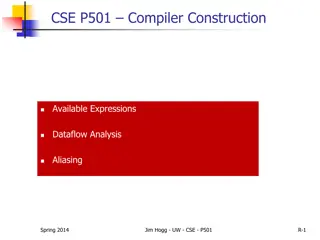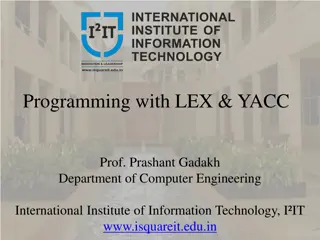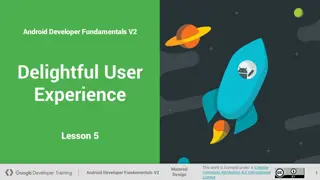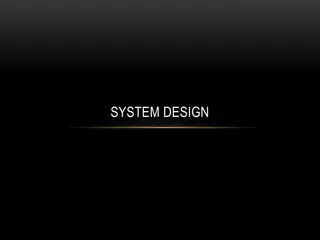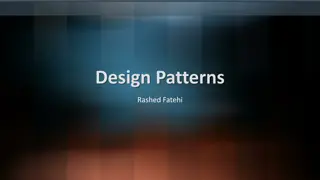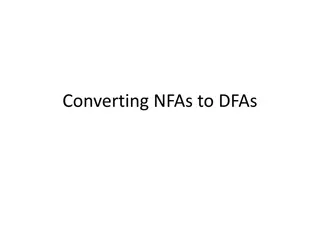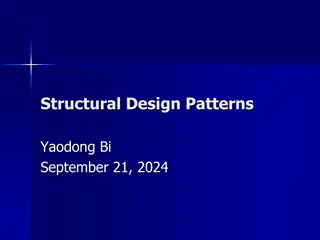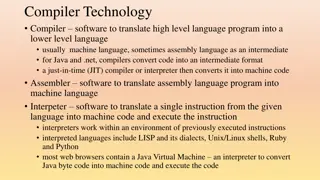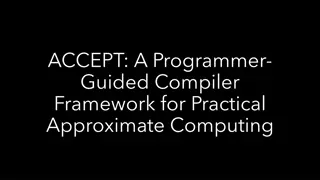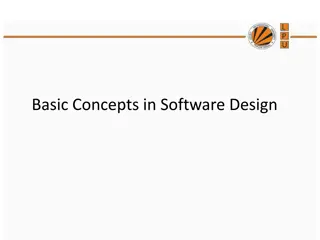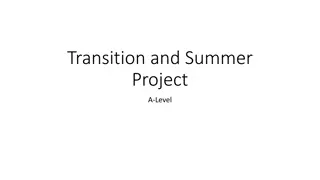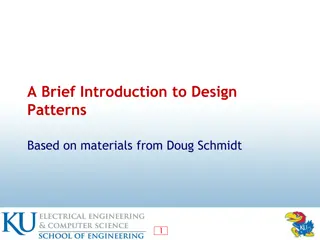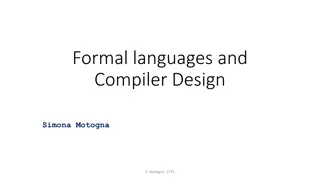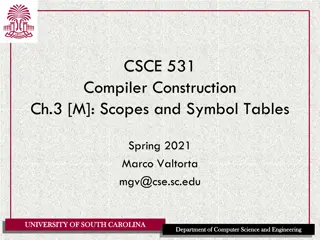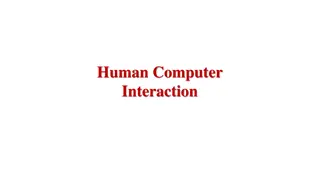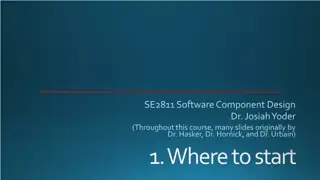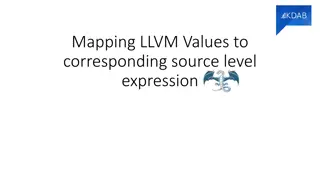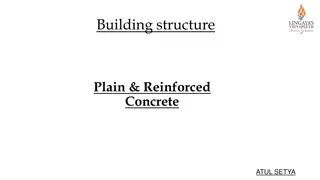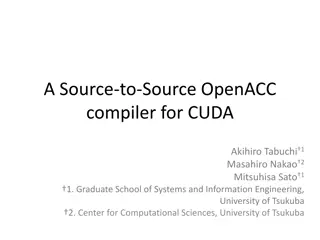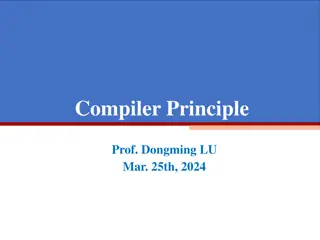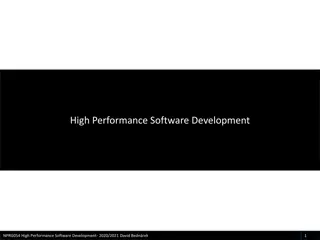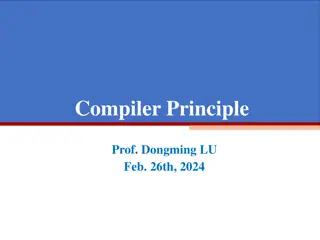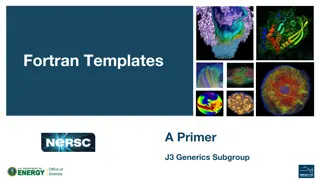TVM: An Automated End-to-End Optimizing Compiler for Deep Learning
TVM is a compiler that generates optimized code for diverse hardware back-ends from high-level specifications of deep learning programs, addressing the challenges of diverse hardware characteristics.
5 views • 16 slides
Understanding Software Analysis and Design Process
Software analysis and design involve a systematic approach to understanding user requirements, creating logical models, and transitioning to detailed design specifications. Requirements analysis focuses on capturing system requirements, while design translates these requirements into implementation
7 views • 16 slides
Understanding Left Recursion and Left Factoring in Compiler Design
Left recursion and left factoring are key concepts in compiler design to optimize parsing. Left recursion can be problematic for top-down parsers and needs to be eliminated using specific techniques. Left factoring is a method to resolve ambiguity in grammars with common prefixes, making them suitab
0 views • 15 slides
Guidelines for Design of Cement Concrete Pavement and Interlocking Paver Blocks
This document provides guidelines for designing cement concrete pavements and interlocking paver blocks, covering factors governing design, wheel loads, design period, subgrade characteristics, approximate k values based on CBR values, and the importance of a sub-base below concrete pavements. It em
0 views • 67 slides
Software Engineering Design Principles and Concepts
The chapter discusses the essential principles and concepts in software design, highlighting the four key design models - data design, architectural design, interface design, and component-level design. It emphasizes the importance of traceability to the analysis model, minimizing the gap between so
0 views • 36 slides
Introduction to Programming in C Language
C language is a procedural programming language developed by Dennis Ritchie in 1972. Known for its low-level access to memory, simple keyword set, and clean style, C is ideal for system programming tasks like operating system and compiler development. This article covers key aspects of C language, P
0 views • 12 slides
Evolution of Compiler Optimization Techniques at Carnegie Mellon
Explore the rich history of compiler optimization techniques at Carnegie Mellon University, from the early days of machine code programming to the development of high-level languages like FORTRAN. Learn about key figures such as Grace Hopper, John Backus, and Fran Allen who revolutionized the field
0 views • 49 slides
Falcon: An Optimizing Java JIT Compiler Overview
Explore Falcon, an LLVM-based just-in-time compiler for Java bytecode developed by Azul Systems. Learn why using LLVM to build a JIT compiler is beneficial, address common objections, and dive into the technical and process lessons learned through its development timeline.
0 views • 66 slides
Enhancing Chapel Compiler with Interfaces and Semantic Changes
Explore the evolution of Chapel compiler with the integration of interfaces, semantic modifications, and improvements in error messages. Delve into the concepts of constrained generics, function call hijacking prevention, and the impact on compiler efficiency.
0 views • 30 slides
Distributed Graph Coloring on Multiple GPUs: Advancements in Parallel Computation
This research introduces a groundbreaking distributed memory multi-GPU graph coloring implementation, achieving significant speedups and minimal color increase. The approach enables efficient coloring of large-scale graphs with billions of vertices and edges. Additionally, the study explores the pra
0 views • 22 slides
PuReMD Design - Initialization, Interactions, and Experimental Results
PuReMD Design involves the initialization of neighbor lists, bond lists, hydrogen bond lists, and coefficients of QEq matrix for bonded interactions. It also implements non-bonded interactions such as charge equilibration, Coulomb's forces, and Van der Waals forces. The process includes the generati
0 views • 23 slides
Understanding System on Chip (SoC) Design and Components
Explore the world of System on Chip (SoC) design, components, and working flow. Learn about Intellectual Properties (IP), platform-based design, typical design flows, top-down design approach, and the emerging Electronic System Level (ESL) design flow. Discover the essential components of an SoC, su
0 views • 45 slides
Ensuring Equivalence in Compiler Optimization Programs
Explore the challenges of proving equivalence in compiler optimization programs, validate refactorings, and analyze the trustworthiness of compilers through binary equivalence testing. Learn about handling loops, utilizing decision procedures, and running tests to confirm program behavior.
0 views • 24 slides
Exploring Design Inspiration and Elements in Costume and Fashion Design
Dive into the world of costume and fashion design through a visual journey of finding design inspiration, understanding the design process, emphasizing originality, and exploring different sources of creativity. Discover how technology, art, food, history, architecture, and nature can spark innovati
0 views • 45 slides
Enhancing Piping Design Efficiency with Spec-Driven Technology
Explore how Spec-Driven Piping technology powered by CADACTIVE offers a standardized approach for piping design in Creo Parametric. This innovative extension streamlines design communication, eliminates errors, and improves design efficiency by utilizing a master catalog, automated checking capabili
0 views • 15 slides
Dataflow Analysis for Available Expressions in Compiler Construction
Utilizing dataflow analysis techniques, the concept of available expressions is discussed in the context of compiler construction. The goal is to identify common subexpressions that span basic blocks by calculating their availability at the beginning of each block. The process involves determining w
0 views • 59 slides
Introduction to Lex and Yacc: Compiler Design Essentials
Lex and Yacc are essential tools in compiler design. Lex serves as a lexical analyzer, converting source code to tokens, while Yacc is a parser generator that implements parsing based on BNF grammars. Through these tools, strings are processed, and code is generated for efficient compilation. This i
0 views • 10 slides
Material Design: Combining Classic Design Principles with Technological Innovation
Material Design is a design language that combines traditional design principles with the possibilities offered by technology and science. It emphasizes visual language, classic design elements, and innovation to create delightful user experiences. The Material Metaphor, Imagery, Typography, Color,
0 views • 34 slides
Comprehensive Guide to System Design Components and Techniques
System design involves the detailed planning and identification of components in an information system, aiming to provide users with a general understanding of the new system. This process includes techniques like flowcharts, prototyping, and component design, covering aspects such as output design,
0 views • 24 slides
Understanding Design Patterns: A Comprehensive Overview
Exploring the world of design patterns, this content delves into the essence of design patterns, their application in software design to resolve complexity, and the different types of design patterns - creational, structural, and behavioral. It also showcases examples of popular design patterns such
0 views • 22 slides
Compiler Data Structures and NFA to DFA Conversion
Compiler data structures play a crucial role in the compilation process, handling lexical analysis to code generation. Understanding the conversion from non-deterministic finite automata (NFA) to deterministic finite automata (DFA) is essential for efficient language processing and optimization.
0 views • 10 slides
Understanding Façade Design Pattern in Structural Design Patterns
Façade design pattern simplifies the interface of a complex system by providing a unified and straightforward interface for clients to access the system's functionalities. It helps in isolating the clients from the complexities of underlying components, offering a more user-friendly experience. The
0 views • 48 slides
Overview of Compiler Technology and Related Terminology
Compiler technology involves software that translates high-level language programs into lower-level languages, such as machine or assembly language. It also covers decompilers, assemblers, interpreters, linkers, loaders, language rewriters, and preprocessing steps used in compilation. Understanding
0 views • 29 slides
ACCEPT: A Programmer-Guided Compiler Framework for Practical Approximate Computing
ACCEPT is an Approximate C Compiler framework that allows programmers to designate which parts of the code can be approximated for energy and performance trade-offs. It automatically determines the best approximation parameters, identifies safe approximation areas, and can utilize FPGA for hardware
0 views • 15 slides
Understanding Basic Concepts in Software Design
Software design involves transforming customer requirements into a form suitable for implementation, with activities categorized into preliminary and detailed design stages. High-level design focuses on module identification and control relationships, while detailed design entails defining data stru
1 views • 24 slides
Exploring 3D Design and Critical Analysis in Architecture
Dive into the world of 3D design and critical analysis with a focus on architecture. Discover the stages of design, essential skills for designers, and areas of study in three-dimensional design. Delve into iconic buildings like Frank Lloyd Wright's Falling Water, analyze their key features, and eve
0 views • 9 slides
Understanding Design Patterns in Object-Oriented Design
Design patterns in object-oriented design (OOD) are essential templates that codify best practices for solving common problems. They help streamline development by capturing proven design decisions, promoting code reuse, and enhancing system flexibility and modularity. Learn about the core concepts,
0 views • 20 slides
Formal Languages and Compiler Design by Simona Motogna - Overview
This content provides an in-depth look into the course "Formal Languages and Compiler Design" by Simona Motogna. Covering topics such as compiler design, organization issues, history of programming languages, structure of a compiler, scanning techniques, and more. It also delves into the components
0 views • 18 slides
Understanding Scopes and Symbol Tables in Compiler Construction
Scopes and symbol tables play a crucial role in programming languages by regulating the visibility of identifiers and establishing the relationship between binding and applied occurrences. Language issues such as single vs. multiple-pass compilation further impact the implementation of compilers, as
0 views • 26 slides
Understanding Interaction Design in Human-Computer Interaction
Interaction design focuses on creating interactive products that are easy, effective, and enjoyable to use. It aims to reduce negative user experiences while enhancing positive ones. Designing interactive products requires understanding user activities, interfaces, and device arrangements to support
0 views • 11 slides
SE2811 Software Component Design Overview
This course covers software component design, design patterns, object-oriented design, algorithms, and opportunities for reuse in systems design. It emphasizes the importance of domain-level design and provides insights into solving core problems through reusable classes.
0 views • 21 slides
Understanding Compiler Optimizations in LLVM: Challenges and Solutions
Compiler optimizations in LLVM, such as loop vectorization, are crucial for enhancing program performance. However, understanding and addressing optimization challenges, like backward dependencies, can be complex. This article explores how LLVM values map to corresponding source-level expressions an
0 views • 41 slides
Analysis of Bunch Lengthening in CEPC for Different Design Parameters
This study explores bunch lengthening in the Circular Electron Positron Collider (CEPC) for various design parameters, analyzing a 54 km design scheme, a 61 km design scheme, and a 100 km design scheme. The analysis includes the theoretical framework used, equations for bunch lengthening, and conclu
1 views • 15 slides
Understanding Plain & Reinforced Concrete Structures in Design Engineering
In the design of Plain & Reinforced Concrete structures, various strength design methods such as Ultimate Strength Design (USD) and Allowable Strength Design (ASD) are utilized. These methods involve factors of safety, material strength, load factors, and analysis in the elastic range. Additionally,
0 views • 11 slides
OpenACC Compiler for CUDA: A Source-to-Source Implementation
An open-source OpenACC compiler designed for NVIDIA GPUs using a source-to-source approach allows for detailed machine-specific optimizations through the mature CUDA compiler. The compiler targets C as the language and leverages the CUDA API, facilitating the generation of executable files.
0 views • 28 slides
Overview of Compiler Principle - Prof. Dongming LU
Introduction to compiler principles with a focus on lexical analysis, parsing, abstract syntax, semantic analysis, activation records, translating into intermediate code, and other key aspects related to bindings in the Tiger compiler. The content covers topics like semantic analysis, name spaces, t
0 views • 21 slides
High Performance Software Development - Topics and Related Lectures
This course on High Performance Software Development covers various topics such as modern programming styles, CPU properties, performance tuning, compiler optimization, memory hierarchy, and more. It also emphasizes the importance of using vector instructions within C/C++ for parallel programming. T
0 views • 10 slides
Compiler Principle by Prof. Dongming LU: Overview and Phases
Compiler Principle course explores the translation of programming languages into executable code using techniques, data structures, and algorithms. The course covers modules, interfaces, and phases of a typical compiler, emphasizing the importance of abstract syntax and intermediate code. Key concep
0 views • 37 slides
Understanding Fortran Templates and Compiler-Driven Design Goals
Delve into the world of Fortran templates through a primer on generics, showcasing design goals set by the compiler. Explore syntax examples and motivating examples such as the AXPY subroutine, offering insight into the self-consistent nature of templates and their flexibility in parameter combinati
0 views • 9 slides
Overview of COMP.520: Compilers with S. Ali
An overview of COMP.520: Compilers with S. Ali covering topics such as LLVM, JIT compilers, interesting ID errors, virtual address table vs VAT pointer, PA4 overview, local declarations, field declarations, method declarations, and variable access. The course includes important announcements and rec
0 views • 63 slides
